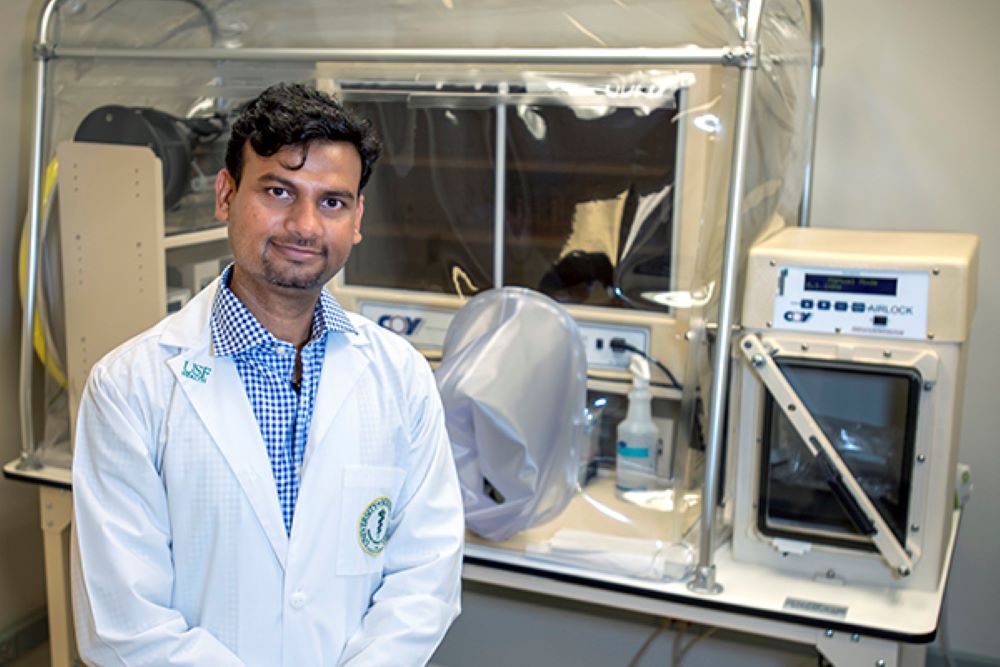Hariom Yadav, PhD, can’t get a particular cocktail off his mind — especially because our aging population potentially could benefit from the benefits for brain health that this punch may pack.
The drink is a unique blend of probiotics that can positively impact the microbiome, the unseen community of microorganisms that live by the trillions in a person’s gut.
In a healthy individual, those microorganisms live harmoniously in their vast internal community. But the gut also can become populated with certain bacteria and viruses that can cause disruptions throughout the body, ultimately triggering a progression over time that contributes to dementia and Alzheimer’s disease — a major problem, especially given that the number of new patients diagnosed with dementia is expected to double to roughly a million a year, by 2060.
Dr. Yadav, director of the USF Health Center for Microbiome Research and associate professor of Neurosurgery and Brain Repair in the USF Health Morsani College of Medicine, is senior author of two newly published studies involving two teams of USF Health researchers. His research focuses on how gut health influences brain health and cognitive decline. (Read about the other new study here.)
His team’s findings about the probiotic cocktail, published in Nature Scientific Reports in January, suggests that the concoction could become a novel therapy to help lower the risk of Alzheimer’s disease and other forms of dementia. While the research has many further steps of testing to see whether the cocktail lives up to its potential, it proposes a different approach to preventing dementia. Existing medications for Alzheimer’s disease target biological mechanisms in the brain, not the gut.
In the study, Protection of Alzheimer’s disease progression by a human-origin probiotics cocktail, Dr. Yadav and his team described developing the cocktail, which contains multiple kinds of probiotics, or strains of “good” bacteria known to help keep the human gut working as it should. Study mice received the cocktail in their drinking water for 16 weeks and then performed a “water maze” test, in which they are given visual cues to help them swim to a hidden underwater platform. Cocktail-drinking mice were consistently able to find the platform faster.
Dr. Yadav’s team found that the cocktail reduced the levels of proteins that can cause the build-up of sticky plaques in the brain. It also appeared to lower levels of brain inflammation and preserve tight junctions in the blood-brain barrier — preventing leakage of harmful microorganisms into the brain. The results suggest that this probiotics mixture could decrease the progression of cognitive decline and Alzheimer’s disease.
“We actually developed this cocktail a few years back,” Dr. Yadav said. “Normally, people look at some single-strand probiotics. But we discovered that when they are put together as a consortia, they actually have more power for manipulating microbiomes, switching them from the bad side to the good side.”
Dr. Yadav and his team stressed in their study that emerging evidence demonstrates early interventions in Alzheimer’s disease can delay or even prevent the progression of symptoms.
“Therefore,” they concluded, “there is a need to develop novel, disease-modifying treatments that can be implemented early in life, ensuring long-term safety.”
The team systematically explored what is happening both in the gut and the brain, establishing a link between the two in triggering cognitive problems. What they observed was that a condition called “leaky gut,” which allows harmful microorganisms escape from the intestines into the bloodstream, thus contributed systemic inflammation. From there, inflammation traveled to the brain, where they are supposed to be blocked by the blood-brain barrier, but in this case they penetrate to brain and cause neuroinflammation and neuronal damage causing dementia.
“Think about this: not everything we eat enters our blood — only selected nutrients get absorbed in our gut and enter the blood circulation,” Dr. Yadav said. “But what happens with leaky gut is that many ingredients not supposed to enter our blood start going in, and our immune cells react to them. My analogy is an angry kid who runs off in a fit screaming this way and that way. These inflammatory immune cells are like that. They go everywhere and actually enter the brain, where they are not supposed to go.”
The brain, in turn, recognizes a foreign particle and its own immune system is activated. The result is neuroinflammation, which can increase the chance of dementia.
“Basically, whenever our body’s inflammation rises, the blood-brain barrier’s permeability rises as well,” Dr. Yadav said. “It becomes weaker and allows leakage from the gut in there.”
The probiotic cocktail serves to decrease inflammatory bacteria in the gut, effectively suppressing that population. Dr. Yadav and his team are currently working on commercializing the cocktail, in contact with various companies to potentially bring it to market.
“We’re still at the stage of whether we want to have our own start-up to license the technology, but first we need to have a clinical trial done,” he said. “We want to be sure of its clinical efficacy, but we are optimistic about that.”
Santosh K. Prajapati, PhD, first author of the cocktail study, hopes the probiotic mix will prove to have broad potential as an effective early treatment.
“Ultimately, our goal is to develop a safe, simple, effective and adherent probiotics formulation that can be implemented in our daily dietary habits to slow and/or prevent neurodegenerative conditions,” Dr. Prajapati said.
Other USF Health researchers who contributed to the study are: Shalini Jain, Shaohua Wang and Sidharth P. Mishra.
